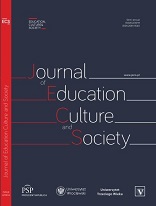CONNECTION BETWEEN PERSONAL PERFECTIONISM AND EFFICIENCY OF STUDENTS’ LEARNING ACTIVITIES
CONNECTION BETWEEN PERSONAL PERFECTIONISM AND EFFICIENCY OF STUDENTS’ LEARNING ACTIVITIES
Author(s): Anastasiia Knysh, Oleksandr Romanovskyi, Nina Pidbutska, Iryna ShtuchenkoSubject(s): Social Sciences, Education, Psychology, Adult Education, Comparative Psychology
Published by: Fundacja Pro Scientia Publica
Keywords: perfectionism;learning efficiency;learning activities;students;professional development;adequate goal setting
Summary/Abstract: Aim. The primary objective of this study was to analyze the connection between students’ learning efficiency and different indicators of personal perfectionism. The secondary objective was to study the characteristics of students’ learning effectiveness depending on the level of perfectionism. Methods. The participants of the study were 110 students studying at the National Technical University “Kharkiv Polytechnic Institute”. The level of personal perfectionism was measured with use of “Perfectionism” questionnaire by N.H. Haranian and A.B. Kholmohorova. The level of learning activities efficiency was measured due to expert evaluation with participation of 26 lecturers-experts. Descriptive statistics were used to report means and standard deviations of perfectionism scales and learning efficiency levels. T-test was used for finding differences in level of personal perfectionism among students with different level of learning efficiency. Pearson correlation coefficient was used for establishing correlations between level of learning efficiency and different scales of personal perfectionism. Results. The level of learning efficiency of students depends on the pace of learning, the quality of learning, the ability to generalize and synthesize new information. Positive statistically significant correlations were found between perfectionism and student learning efficiency. Conclusions. The study identified that the most vulnerable to manifestations of perfectionism is a group of students who demonstrate the highest achievement in learning. Due to the excessive expectations of others (real or fictional), they set unrealistic goals, do not feel satisfied with their achievements, do not adequately assess their capabilities.
Journal: The Journal of Education, Culture, and Society
- Issue Year: 11/2020
- Issue No: 1
- Page Range: 136-145
- Page Count: 10
- Language: English

